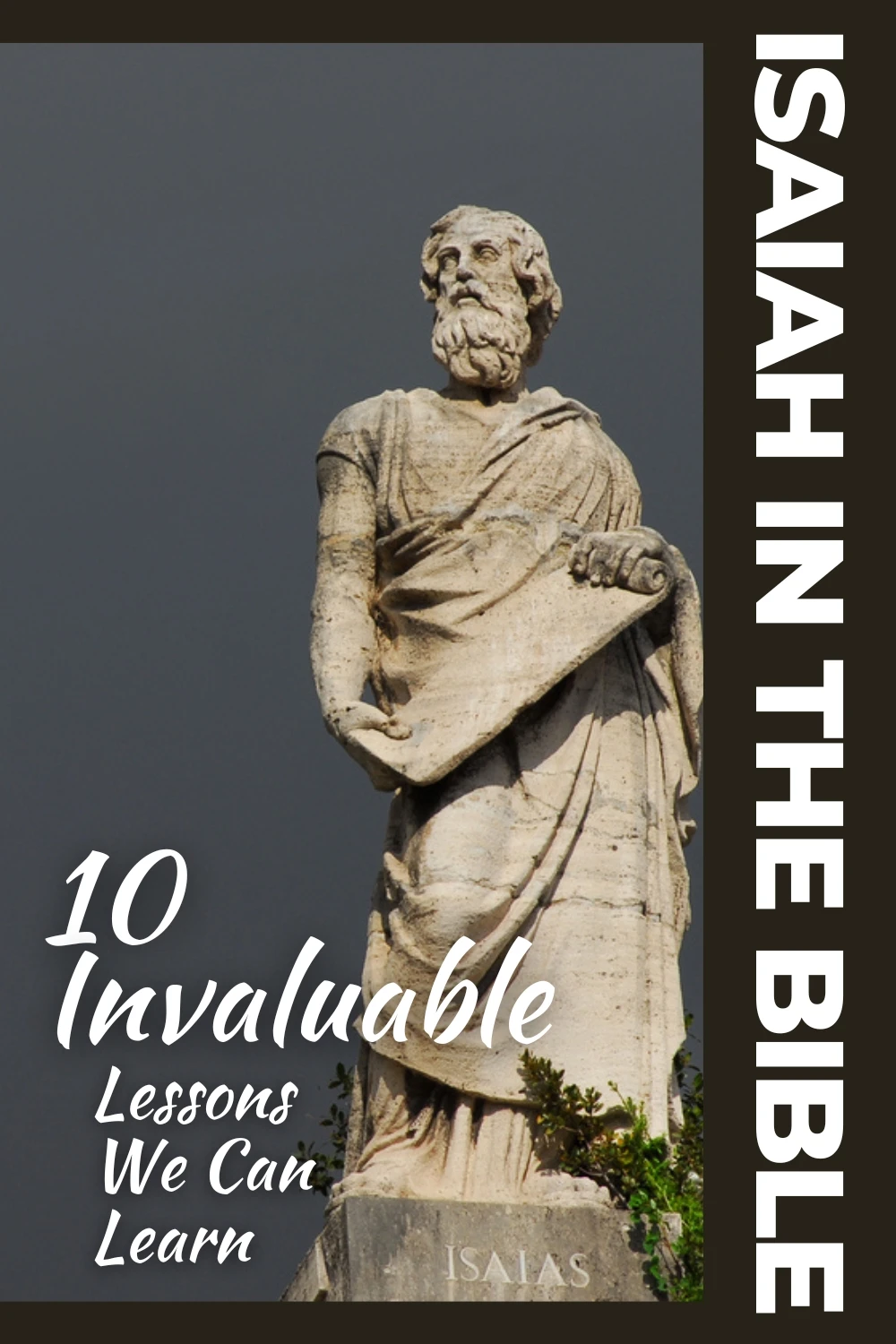This page/post may contain affiliate links. As an Amazon Associate, as well as an affiliate of other programs, this means if you purchase something using these links, I will receive a commission on qualifying purchases at no cost to you! For more detailed information, please visit our Affiliate Disclaimer page
Isaiah in the Bible, a towering figure,, is known as one of the Major Prophets and holds a significant place in both Jewish and Christian traditions. His life and prophetic ministry are chronicled primarily in the Book of Isaiah, spanning chapters 1 to 66 in the Old Testament. To truly understand who Isaiah was in the Bible, the Hebrew Bible (Old Testament), we must explore not only his prophetic words but also the historical and political context in which he lived.

Isaiah in the Bible, Son of Amoz
Early Life and Call to Prophethood
Isaiah, whose name means “Yahweh is salvation,” was likely born in the late 8th century BCE in the southern kingdom of Judah during the reign of King Uzziah. Little is known about his early life or family background, but his encounter with God and call to prophethood is vividly described in Isaiah 6:1-8.
In this vision of Isaiah, he sees the Lord seated on a high and lofty throne, surrounded by seraphim. Overwhelmed by the holiness of God’s presence, Isaiah becomes acutely aware of his own unworthiness and the sinfulness of his people. However, in response to God’s call, Isaiah humbly offers himself, saying, “Here am I. Send me!”
Prophetic Ministry and Historical Context
Isaiah’s prophetic ministry spanned several decades, covering the reigns of multiple kings in Judah, including Uzziah, Jotham, Ahaz, and Hezekiah. This period in ancient Israelite history was marked by political turmoil, external threats from neighboring nations, and internal moral decay. Isaiah’s ministry was as a prophet of God and God’s Word.
During the early years of his ministry, Isaiah witnessed the expanding power of the Assyrian Empire, which posed a significant threat to the stability and sovereignty of the kingdoms of Israel and Judah.
Under the leadership of kings such as Tiglath-Pileser III and Sargon II, the Assyrians conducted military campaigns throughout the region, conquering and subjugating numerous nations, including the northern kingdom of Israel in 722 BCE.
Isaiah’s prophetic messages often addressed his time’s political and social realities, condemning injustice, idolatry, and moral corruption within Israelite society. He warned of God’s impending judgment upon the nation if they did not repent and return to the Lord. The prophecies of Isaiah also contained messages of hope and redemption, promising a future restoration for God’s faithful remnant.
Interactions with Kings and Leaders
Throughout his ministry, Isaiah interacted with various kings and leaders of Judah, offering counsel, rebuke, and encouragement as guided by God’s Spirit. One notable encounter occurred during the reign of King Ahaz when God instructed Isaiah to deliver a message of reassurance regarding the threat posed by the combined forces of Syria and Israel (the Northern Kingdom) against Judah.
In Isaiah 7:14, he prophesied the birth of a child named Immanuel, signifying God’s holiness, presence, and deliverance amidst the crisis.
Therefore the Lord himself will give you a sign. Behold, the virgin shall conceive and bear a son, and shall call his name Immanuel.
Isaiah 7:14 (ESV)
Another significant moment in Isaiah’s interactions with royalty was during the reign of King Hezekiah, whom Isaiah supported in his efforts to reform Judah’s religious practices and renew the covenant with God. During this time, Isaiah famously prophesied the miraculous deliverance of the besieged city of Jerusalem from the Assyrian siege, as recorded in Isaiah 37.
Legacy and Influence
Isaiah’s legacy extends far beyond his immediate historical context, as his prophecies continue to inspire and resonate with believers today. His vivid imagery, powerful language, and profound theological insights have left an indelible mark on both Jewish and Christian theology.
Many of his prophecies, particularly those concerning the Messiah and the future restoration of God’s people, are cited in the New Testament and interpreted as pointing to the person and work of Jesus Christ.

The Book of Isaiah
The Book of Isaiah is one of the prophetic books, and it contains the prophecies and messages delivered by the prophet Isaiah during his lifetime. It is the first of the Major Prophets in the Christian Old Testament and is considered one of the Bible’s longest and most significant prophetic works. It is worth reading the entire book for personal study as you’ll learn so much about God’s work among his people, the good work of Isaiah, and our mighty God.
The Book of Isaiah consists of 66 chapters and is traditionally divided into three main sections:
- Chapters 1-39: These chapters primarily focus on Isaiah’s prophecies and messages during the reigns of the kings of Judah, including the reigns of Uzziah, Jotham, Ahaz, and Hezekiah. Isaiah delivers messages of warning, judgment, and message of hope to the people of Judah and Jerusalem, addressing their sins, injustices, and impending consequences.
- Chapters 40-55: Often referred to as “Deutero-Isaiah” or “Second Isaiah,” these chapters contain prophecies of comfort, restoration, and redemption. Scholars believe that these chapters were likely written by a different author or group of authors during the Babylonian exile, addressing the exiled people of Israel and offering them hope for a future restoration.
- Chapters 56-66: This section, sometimes called “Trito-Isaiah” or “Third Isaiah,” continues the themes of restoration and renewal. It includes prophecies concerning the return of the exiles to Jerusalem, the rebuilding of the city and the Jerusalem temple, and the establishment of God’s kingdom on earth. The holy place was prophesized to be rebuilt.
Isaiah’s prophecies in the Book of Isaiah cover many themes, including the sovereignty of God, the Lord of Hosts, the coming Messiah, the suffering servant, judgment and restoration, and the future glory of Zion. His prophetic words have had a profound impact on Jewish and Christian theology and continue to be studied and revered by believers worldwide.
The Bible is replete with stories of prophets, kings, and ordinary people whose lives serve as timeless lessons for humanity. Among these figures, Isaiah stands out as one of the Old Testament’s most significant and influential prophets.
His prophecies, spanning over several chapters in the Book of Isaiah, offer profound insights into God’s character, human nature, and the path to spiritual redemption. In this blog post, we’ll delve into the life of Isaiah, explore the key themes of his prophecies, and uncover the valuable lessons that his words hold for us today.
Understanding Isaiah in the Bible
Isaiah, whose name means “Yahweh is salvation,” lived in the 8th century BCE during a tumultuous period in ancient Israelite history. He prophesied primarily in the southern kingdom of Judah during the reigns of Kings Uzziah, Jotham, Ahaz, and Hezekiah.
His ministry spanned approximately 40 years, and he witnessed both the rise and fall of the sinful nation, including the Assyrian conquest of Israel and the looming threat of Babylonian dominance.
Themes in Isaiah’s Prophecies
Justice and Righteousness:
Isaiah’s prophecies emphasize the importance of justice, righteousness, and care for the marginalized in society. He condemns social injustices, such as oppression of the poor and widows, and calls for ethical behavior among the people and leaders alike.
Messiah and Redemption:
Isaiah prophesies about the coming of a Messiah, a righteous servant who will bring salvation and redemption to God’s people. These prophecies, often referred to as the “Suffering Servant” passages, point to Jesus Christ in the New Testament.
Judgment and Restoration:
Isaiah warns of God’s judgment upon nations and individuals who turn away from Him but also offers hope for restoration and renewal for those who repent and turn back to God.
The form you have selected does not exist.
10 Lessons from Isaiah in the Bible for Today’s World
- Social Justice and Compassion Isaiah’s teachings on social justice remind us of our responsibility to advocate for the oppressed and marginalized in our communities. We learn the importance of standing up against injustice and extending compassion to those in need.
- Faithfulness in Adversity Despite facing political upheaval and personal challenges, Isaiah remained faithful to his calling as a prophet. His unwavering trust in God’s sovereignty serves as a model for us to trust in God’s providence, even in the midst of trials and uncertainties.
- Hope in God’s Promises Isaiah’s prophecies of restoration and redemption remind us that God is faithful to His promises. In times of despair or uncertainty, we can find hope and assurance in God’s unfailing love and His plans for our future.
- Global Injustice In a world marked by inequality, oppression, and conflict, Isaiah’s message of justice and righteousness remains relevant. It challenges us to address systemic injustices and work towards creating a more just and equitable society.
- Personal Redemption In an era plagued by spiritual emptiness and moral decay, Isaiah’s message of redemption through the Messiah offers hope and healing to individuals seeking purpose and forgiveness.
- Political Turmoil In times of political upheaval and uncertainty, Isaiah’s call to trust in God’s sovereignty provides comfort and assurance that God remains in control, regardless of the circumstances.
- Faithfulness in Obedience Isaiah’s unwavering commitment to God’s call serves as a powerful example of faithfulness in obedience. Despite the challenges and dangers he faced as a prophet, Isaiah remained steadfast in delivering God’s messages to the people, even when they were difficult to hear. His willingness to obey God’s commands, even in the face of opposition, reminds us of the importance of trusting in God’s guidance and following His will, regardless of the circumstances.
8. Courage in Speaking Truth Isaiah’s boldness in speaking truth to power demonstrates the importance of courage in standing up for righteousness and justice. Throughout his prophetic ministry, Isaiah fearlessly confronted kings, leaders, and the people of Judah with messages of repentance, judgment, and hope.
His willingness to speak out against injustice, oppression, and idolatry, even when it was unpopular, teaches us the value of courageously advocating for what is right, even in the face of opposition or persecution.
9. Hope in God’s Promises Isaiah’s prophecies of hope and restoration amidst times of despair and destruction remind us of God’s enduring faithfulness and promises. Despite the dire circumstances facing the nation of Judah, Isaiah proclaimed messages of hope, redemption, and renewal, assuring the people of God’s plans for their future.
His prophecies of the coming Messiah and the establishment of God’s kingdom offer timeless hope and assurance to believers, reminding us to trust in God’s promises, even amid uncertainty and adversity.
10. Repentance and Forgiveness Isaiah’s call to repentance and forgiveness underscores the importance of acknowledging and turning away from sin. Throughout his prophecies, Isaiah repeatedly called the people of Judah to repentance, urging them to forsake their wicked ways and return to God.
He proclaimed God’s willingness to forgive and restore those who genuinely repented, highlighting the importance of humility, contrition, and seeking forgiveness in our relationship with God.
In summary, the life and teachings of Isaiah in the Bible offer valuable lessons on faithfulness, courage, hope, repentance, and justice that remain relevant and inspiring for believers today. As we study Isaiah’s prophecies and reflect on his example, may we be encouraged to live lives characterized by obedience to God’s will, boldness in speaking truth, trust in God’s promises, repentance and forgiveness, and commitment to justice and compassion.
You may enjoy this animated version of Isaiah in the Bible:
You may also enjoy one of these highly recommended resources:
Isaiah – Bible Study Book with Video Access: Striving Less and Trusting God More by Melissa Spoelstra
Insights on the Book of Isaiah: A Verse-by-Verse Study by Dr. Alan B. Stringfellow
Isaiah: A 12-Week Study (Knowing the Bible) by Drew Hunter
ESV – “Scripture quotations are from The ESV® Bible (The Holy Bible, English Standard Version®), copyright © 2001 by Crossway, a publishing ministry of Good News Publishers. Used by permission. All rights reserved.”

